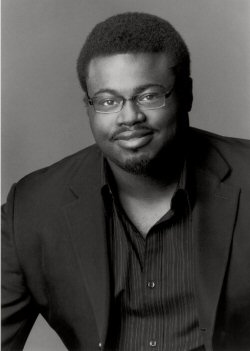Tenor Thomas at his finest in English and American art songs

Russell Thomas
Orchestra Miami presented tenor Russell Thomas in a wide-ranging recital Saturday night at First Presbyterian Church of Miami. Eschewing the usual aria collections, Thomas offered ambitious song cycles by Britten, Vaughan Williams and Charles Tomlinson Griffes as well as a sampling of the Italian songbook, accompanied by the orchestr’s artistic director Elaine Rinaldi.
A native Miamian who has sung leading roles at the Met, Thomas is an imposing lyric tenor. His dark vocal timbre, powerful high notes and expressive delivery were best suited to the verbal tone painting of the English and American art songs.
In the opening Adelaide by Beethoven, Thomas adroitly shaped the vocal line but exhibited some strain in the upper register. Verdi’s Stornello, two of Stefano Donaudy’s songs and Paolo Tosti’s L’alba Separa found Thomas exuding bold fervor that threatened to become overpowering. Greater dynamic subtlety and Italianate squillo are needed in this repertoire but the sincerity of Thomas’ high-powered vocalism brought cheers from the supportive audience.
The American composer Griffes was a student of Humperdinck. Best known for such exotic tone poems as The White Peacock and The Pleasure Dome of Kubla Khan, Griffes’ songs and piano miniatures exhibit a dark sensibility. His Three Poems of Fiona MacLeod (1918) combine impressionistic piano figurations with strongly individualized vocal lines.
The Lament of Ian the Proud is a moody threnody of a blind, thwarted lover. Thy Dark Eyes to Mine is a deceptively simple ballad turned into a lament for lost love. Most audaciously, The Rose of Night is melodically and tonally ambiguous, flirting with modernist techniques without quite crossing the line. Thomas’ big-hearted performances captured the drama of these early American art songs potently. Rinaldi’s superb articulation of Griffes’ imaginative keyboard writing was no less impressive.
Dating from the composer’s American sojourn during World War II, Benjamin Britten’s Seven Sonnets of Michelangelo are alternately declamatory and lyrical, with a suggestive homoerotic overtone. Thomas powerfully conveyed Britten’s verbal painting and exhibited a natural affinity for the composer’s distinctive vocal idiom. Hope, heartbreak and longing were woven into this monodrama, composed for Peter Pears, Britten’s tenor muse and life partner. With a voice of greater richness and depth than Pears, Thomas brought commanding passion to this worthy revival of a too infrequently heard twentieth century classic.
Ralph Vaughan Williams’ Songs of Travel are usually sung by a baritone but were originally composed for tenor. Thomas made a strong case for the original version, the higher voice bringing greater incisiveness and timbral variety to this cycle. Often considered a British version of Schubert’s Winterreise, Vaughan Williams’ traveler journeys through the seasons of love and loss, accepting his decisions, mistakes and eventual death.
The composer’s interest in folk songs of the British Isles asserts itself immediately in The Vagabond. From the wonder of Youth and Love to the reverie of In Dreams to the quietly tragic Epilogue, this cycle is a rousing, song filled, ultimately moving paean to life lived fully if not wisely. Thomas’ vocal finesse underscored the tragedy beneath even the lively songs and proved the evening’s most impressive platform for his expressive resources.
Repeated curtain calls brought the inevitable tenor bon-bon La donna e mobile from Verdi’s Rigoletto, dispatched with verve. Throughout the program Rinaldi was a supportive accompanist, encompassing the austerity of Britten and the Italianate gusto of Tosti with equal skill and commitment.
Posted in Performances
Leave a Comment
Sun May 15, 2011
at 1:22 pm
No Comments






